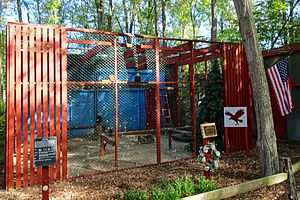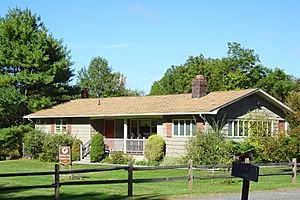The Raptor Trust facts for kids
The Raptor Trust is a special place in Millington, New Jersey. It's a hospital and home for wild birds that are hurt or orphaned. This center is right next to the Great Swamp National Wildlife Refuge, a big natural area.
They help birds get better so they can go back into the wild. They also care for birds that can't be released.
How The Raptor Trust Started
Len Soucy loved hawks. His interest grew after visiting the Hawk Mountain Sanctuary in Pennsylvania in 1964. In 1968, he bought land in Millington.
With his family, Len began caring for injured birds of prey in their backyard. More and more people learned about their work. Soon, they added a bird hospital. By the late 1970s, hundreds of birds came for help each year. The Soucy family paid for most of this work themselves.
In 1982, The Raptor Trust became a non-profit organization. This meant it was set up to help birds without making money. Its main goals are to give free care to injured or orphaned birds. They also teach people about birds, especially birds of prey. The trust wants to show how to treat animals kindly.
What The Raptor Trust Does Today
Today, The Raptor Trust has many important facilities. They have an infirmary, which is like a hospital for birds. There are also buildings for teaching visitors about birds. You can find a gift shop too.
The center has about 70 cages and aviaries. These are large enclosures where birds can recover. Some birds stay there permanently if they cannot return to the wild. About 40 hawks, eagles, and owls live there all the time.
These permanent resident birds are very important. Some have even had babies successfully. They can also act as foster parents for younger birds. This helps young birds learn how to be wild. Visitors can see many of these amazing birds up close.
 | Misty Copeland |
 | Raven Wilkinson |
 | Debra Austin |
 | Aesha Ash |



